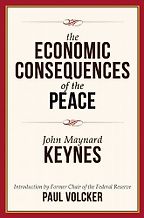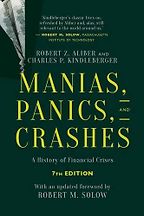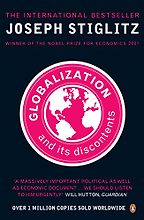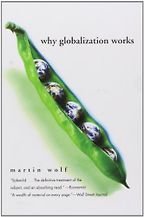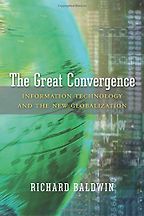Our topic is globalization. Before we dive into the books please tell us how you define the term.
Globalization is the phenomenon of increasing interconnection between the world’s economies as reflected in the flow of goods, capital, people and ideas.
As President Clinton’s last Treasury Secretary and President Obama’s first Director of the National Economic Council, you stewarded the world’s largest economy through recent rough waves of globalization. What did you learn about globalization as an economic policy practitioner?
I learned that you can’t get it right without getting the economics right. The laws of economics are as difficult to defy as the laws of physics. No matter how strong the political will, a bridge configured certain ways will stand and bridges configured other ways will collapse: how strongly politicians feel either way does not matter. Similarly, if you print too much money you will have inflation, if you borrow too much you will not be able to pay back your debts, if you prohibit exchange you will be impoverished relative to what openness would make possible. All of these will hold true regardless of what a politician might say.
There are a set of economic laws that one has to understand and respect in shaping policy. At the same time, within the constraint of the laws of economics, the art of policymaking is to recognize how people feel, understand their concerns, and make the best possible policies in a political context.
To your books. Let’s begin with John Maynard Keynes. Tell us about The Economic Consequences of the Peace (1919).
It’s among the dozen—perhaps half-dozen—most influential economics books that have ever been written. For a hundred years, it has set the terms of the debate over the Versailles Treaty. It galvanized the political dialogue around what was going to take place post-World War I. This book, combined with subsequent events, shaped the much more generous approach that was taken to the defeated countries in creating an international system after World War II.
“There will be a tendency, after any period when things go well for people, to become complacent and take more risks.”
From an economic point of view, it highlighted the importance of the transfer problem—the fact that when you force a country to pay resources, it not only loses those resources but, because it has to sell more, it puts its goods on sale, which is further impoverishing. And it established a model that no economist has subsequently lived up to, the model of an economist as both an analyst and an extraordinary polemicist.
Like you, Keynes was in the room where it happened—in this case the Hall of Mirrors—shaping the policies that emerged. Please describe that aspect of the book.
Not many economists have the powers of description of a skilled novelist or a journalist. But as Keynes punctures what he sees as the pompous moralism of Woodrow Wilson or the small-minded hypocrisy of Lloyd George and Georges Clemenceau, it’s an extraordinarily vivid depiction of not just the outcome, but also the process.
Economic Consequences of the Peace is clearly a fascinating historical document. Please expand on its relevance for us today.
All analogies are imperfect—and it’s always wrong to analogize without reflection on difference—but it is relevant to situations like the debt burden facing Greece and other questions on the European periphery. It is relevant, more broadly, to the need for a global order and global cooperation if the descent of the global economy is to be avoided.
Next, please tell me about Charles Kindleberger’s Manias, Panics, and Crashes: A History of Financial Crises (1978).
This is written by a very learned economic historian who published treatises on the Depression and other major historical developments. It is the definitive informal history of financial bubbles and euphorias, which have done so much to shape history—whether it was the stock market bubble that preceded the Great Depression or the bubble in Japan in the late 1980s or the mania associated with tulips in Holland centuries ago. The lives of tens of millions of people are affected by these financial fluctuations and the decisions governments make about how to respond to them. Kindleberger’s book tells that story.
Are crises inevitable, as Kindleberger seems to see them? Can we tame manias and panics?
The hope of economics—of the kind of policy embodied in the Dodd-Frank Act, or the response that the Obama Administration mounted in 2009, which produced a very different outcome in 2009 than we saw from similar antecedent circumstances in 1929—all of that says that there is no basis for fatalism. Policy choices can make a very big difference in both prevention and recovery.
Get the weekly Five Books newsletter
At the same time, Kindleberger’s book carries the message that, while policies may change and economic circumstances may vary, human psychology and oscillation between fear and greed are likely to always be with us. There will be a tendency, after any period when things go well for people, to become complacent and take more risks. Kindleberger’s message is that complacency can be a self-denying prophecy.
On to the twenty-first century. Nobel Laureate Joe Stiglitz published Globalization and its Discontents in 2002. Tell us about it please.
Joe Stigiltz’s Globalization and its Discontents is a book that anyone looking for a rounded set of perspectives on globalization should read. Joe Stiglitz has been one of the world’s leading economic theorists since the 1960s. In the last two decades, he has developed great passion and conviction around a highly critical view of open markets and globalization. There is much in his book that I do not agree with—there is more ad hominem attack them I am comfortable with and Stiglitz is better on the theoretical argument then he is on the actual history of major episodes. But this book has emerged as the leading statement of many of the critiques of an open global system, therefore I think it deserves substantial attention.
Were his critiques prescient? And how have the reasons for discontent with globalization changed since 2002?
They were prescient in a very broad brush way. With the financial crisis in 2008, we obviously saw major difficulties with the global economy. They were prescient in that popular resistance to trade has certainly increased over time, as manifest in the Brexit vote and the election of Donald Trump.
Beyond the broad brush, I’m not sure how his critiques were prescient. Many of the issues today involve questions relating to the flow of people. So while Stiglitz’s book very much maintains its relevance, today the cutting edge issues have changed.
On to Martin Wolf’s 2004 defense of globalization Why Globalization Works. Is defense a fair characterization? Tell us about Why Globalization Works.
Wolf’s book makes, in the most effective way I have seen, the classical economic arguments for openness. At root, the argument for free trade is not anything fancy and analytical. It’s that you and I won’t engage in an exchange unless we’re both better off and if we’re both better off, why should anyone else object, unless our exchange is inflicting some harm on someone else? Our exchange can take the form of my buying something from you, an import, or you buying something from me, an export, or of my lending you money, a capital flow, or of you sharing an idea with me, a transfer of intellectual property.
“I’ve said, for some years, that global integration won’t work if it means local disintegration.”
What Wolf elucidates is all the benefits of exchange. Exchange promotes specialization and the division of labor, as Adam Smith pointed out. Exchange promotes comparative advantage, everyone gets to do what they do best. Exchange promotes competition, which is a huge spur to efficiency.
Wolf writes as a citizen of the world, placing emphasis on the importance of economic events like the hundreds of millions of people lifted out of poverty in China. How relevant are his arguments to people just concerned about the United States or the United Kingdom or even to specific groups within countries, like the white working class?
There are multiple levels. As shown by Brexit and the rise of Trump, what happens far away is not the most pressing concern to people in industrial democracies, particularly when the economies of industrial democracies are struggling. But, ultimately, a world in which poor countries stay poor and in which rich countries are pursuing policies that are actively keeping them poor is very unlikely to be a stable or a successful world. That’s why the lessons of Wolf’s book are very powerful.
Finally, a title from last year. Richard Baldwin’s The Great Convergence (2016). Please give us a precis.
It’s the newest of the books and it’s a very powerful description of the newest phase of globalization. Two ideas about this newest phase of globalization that Baldwin emphasizes are hugely important.
The first is that we used to think very much in terms of trade in goods—some country exports washing machines, some other country exports dryers. Increasingly, goods are produced with global supply chains. Part of a good is produced in one country, part of a good is produced in another country and assembly takes place in a third country. So trade is part of the production process, whether it takes place within a multi-national corporation or between companies. Trade is part of production through supply chains.
The other idea that is emphasized is the role of trade and globalization in sharing knowledge. Baldwin uses a very powerful analogy. He says it’s one thing for a soccer team in one country to play against a soccer team in another country. It’s a very different thing if the coach in one country starts to coach teams in many countries and therefore promotes convergence. Baldwin argues that the second type of openness may be more problematic than the first. And, increasingly, trade is taking that form.
Please explain the challenges to politics and economic policy presented by this “great convergence” he describes.
The challenge is that there are likely to be more winners associated with global convergence, but there are also likely to be more losers and more potential volatility. In this latest stage of globalization, ideas can be traded and support production elsewhere, leading to less identification of entrepreneurship with location. The example I like to give is when George Eastman invented the instamatic camera, he got rich and Rochester, New York, where he founded his company, had a strong middle class for several generations. When Steve Jobs made equally powerful innovations, involving the iPhone and the iPad, the result was that he got very, very rich and there was an increase in the demand for labor globally, primarily in Asia, with no similarly broad increase in local wealth.
In recent years, you have been sounding an alarm about the role of globalization in contributing to local dislocations and inequality. What caused your worries and what are your solutions for globalization going forward.
I’ve said, for some years, that global integration won’t work if it means local disintegration. Unfortunately, that proved prescient. The essence of the solution has to be strengthening our systems of social insurance and preparation of people for a world that’s going to change more rapidly. There is going to be more disruption—disruption associated with progress but also with the replacement of some ways of producing with other ways.
Five Books aims to keep its book recommendations and interviews up to date. If you are the interviewee and would like to update your choice of books (or even just what you say about them) please email us at [email protected]
Five Books interviews are expensive to produce. If you've enjoyed this interview, please support us by donating a small amount.
